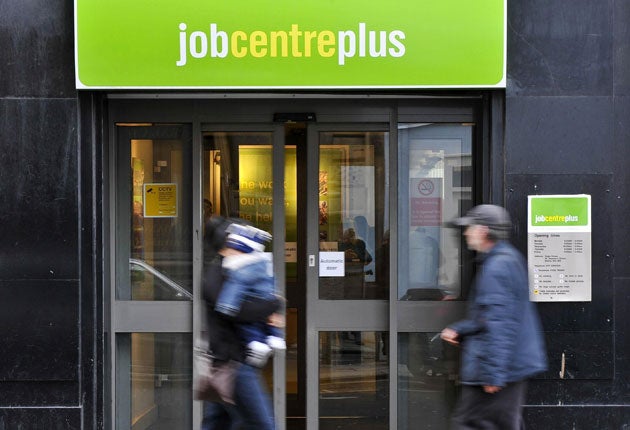Harriet Harman: Direct action can dispel economic gloom
The Opposition has plans to raise the nation's spirits and protect it from the coalition's recklessness, says Labour's deputy leader


Your support helps us to tell the story
From reproductive rights to climate change to Big Tech, The Independent is on the ground when the story is developing. Whether it's investigating the financials of Elon Musk's pro-Trump PAC or producing our latest documentary, 'The A Word', which shines a light on the American women fighting for reproductive rights, we know how important it is to parse out the facts from the messaging.
At such a critical moment in US history, we need reporters on the ground. Your donation allows us to keep sending journalists to speak to both sides of the story.
The Independent is trusted by Americans across the entire political spectrum. And unlike many other quality news outlets, we choose not to lock Americans out of our reporting and analysis with paywalls. We believe quality journalism should be available to everyone, paid for by those who can afford it.
Your support makes all the difference.You don't need the polls to tell you that people are worried. Whether they work in the public or the private sector they're anxious about the security of their job. Even with low interest rates, people are seeing their standard of living fall – with frozen pay having to stretch to meet rising costs, such as energy bills.
And the message they are getting from the Government is relentlessly punitive and gloomy. If you're unemployed it's because you're feckless; if your electricity bill is going up it's because you're too lazy to shop around. If you're a public-sector worker you are "waste" which needs to be cut out of the system.
Ministers promise nothing but more austerity to people who are increasingly doubting the claim that cutting public-sector jobs would "clear a space" for private-sector jobs. The reality is – as Ed Balls warned – that public-sector jobs are going at twice the rate that the private sector is creating jobs.
People feel gloomy, not only because they are losing confidence that the Government can cut its way to economic growth, but because of a growing sense of the unfairness of the cuts. A painful squeeze on your living standards is worse if you know that the pain is not fairly shared.
And seeing the economic storm clouds growing in Europe and the US, people fear that things are only going to get worse.
Our task in opposition is not to wring our hands and wait for the next general election. It's to take action now and win the argument for the future, building a great national movement for change.
We have to do what we can to protect people from the worst impact of the Tory cuts. We are striving to do that by shaming them in parliament. David Cameron was not even aware of the Welfare Reform Bill's cuts in financial support to cancer sufferers until Ed Miliband confronted him at Prime Minister's Questions, demanding the plans be dropped.
There are signs of government change after Labour's campaigns against the attack on women's pensions. And we won the argument against plans to make it harder to secure rape convictions by giving anonymity to rape suspects.
There is a heavy responsibility on our Labour local councillors, who are doing everything they can to protect their communities from the cuts. Following Labour's success in last May's council elections, we have 800 more Labour councillors in England doing just that. And we will have even more in next May's elections. Labour councils are being being unfairly singled out for devastating cuts. Southwark – with high levels of need – is losing £34m, while leafy Richmond upon Thames only has to cut £1m. But Southwark is still helping the "squeezed middle" with free school meals for all primary school children.
The Government has ditched Clause 1 of the Equality Act, designed to ensure that all public policy decisions narrow the gap between rich and poor. But Liverpool City Council and many other Labour councils are going to implement it.
It's not just that inequality scars our society and denies children an equal chance in life. The evidence is that more equal societies are not only fairer but more peaceful, and healthier, so Labour councils are working on that.
We have to strive for equality for women too. Men still earn 20 per cent more than women. And as Yvette Cooper has so lucidly exposed, women are bearing the brunt of the cuts – in jobs, tax credits and services. But even with a government turning back the clock on equality, we can make progress.
The Tories have decided not to implement the Equality Act provision to make each company report the gap between what they pay men and what they pay women. But women in the trade union movement are planning to move this on to the bargaining agenda. Good companies – pressed by committed unions – will do it and it will show the extent of the gender pay gap and be a spur for change.
We will show that even in opposition we can bring about change at national level. We will see tougher rules against the accumulation of unaccountable power by media empires. That change was brought about not by the Government but by Ed Miliband, Leader of the Opposition. He took the lead against Murdoch, and there was nothing for Cameron to do but follow. And we will see that through to a new settlement for a free but also a fair press.
We have to make and win arguments, as well as take action. We have to convince people that austerity is not inevitable, challenging the pessimistic doctrine that the markets are all powerful and politics can't help.
We must continue to confront the Government with the fact that its decisions are making things worse. And while admitting where we got things wrong, we will continue to rebut the Government's lie that Labour caused the global financial crisis rather than irresponsible bankers.
We will go on reminding people that when we left office, the economy was growing and unemployment falling. They will only trust us for the future if they leave behind the belief that we caused the problems they now face.
And through it all we should never collude with the pessimistic and paralysing tide of anti-politics. That suits the right wing but not us. So I am dismayed when I hear any of Labour's elected representative talking disparagingly of "politicians". To allow the notion that all politicians are the same and that we are all bad, leaves the way clear for markets to rule and public services to wither.
Our case is that progressive politics offers choice and change. Concerted political action can make a difference. It did when the world was on the brink of catastrophe in 2008 – avoided then by Labour's global leadership.
In an economic crisis, it is only political action that can mitigate the harm and spread the burden fairly. Democratic politics is the best and only hope. It's hard to give people hope when things look to be getting worse. But we are politicians and in the Labour Party because we believe in a better, fairer life and it is our task to make that happen.
Join our commenting forum
Join thought-provoking conversations, follow other Independent readers and see their replies
Comments